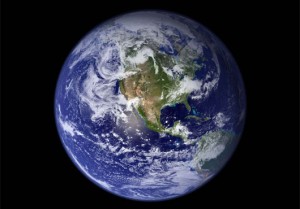Climate change, species extinction, infectious diseases, trade piracy, internet hacking, terrorism, war, trafficking in drugs, weapons and slaves, etc. There are no lack of deadly serious problems that cross national borders in our contemporary world. Indeed, these problems, substantially driven by our increasingly intertwined economies, define our age as global, and call for global citizens.
 There are currently four types of actors that act legally across national borders:
There are currently four types of actors that act legally across national borders:
- National governments facilitate or hinder international trade, cultural and educational exchanges, and diplomatic relations.
- Inter-governmental bodies like the United Nations, the World Bank, and the International Criminal Court, establish and seek to enforce transnational laws.
- Multinational businesses like Walmart, Samsung, Toyota, Saudi Aramco, Apple and many others seek profits abroad.
- Transnational NGOs like the Red Cross, Greenpeace, Gates Foundation, Amnesty International, Avaaz and religious associations mobilize people to pursue common goals across borders.
Each of these actors can make our international problems better, or worse, and advance the public interest or special interests. Whether they do one or the other always depends in no small part on the number and character of their agents. This fact raises a fundamental challenge for our global age: how do we nurture the global citizens who can drive our international institutions to tackle our common problems, and serve the public interest?
Our world needs more global citizens, yet citizenship is too often defined in national terms. Governments of course routinely define and enforce citizens’ rights and responsibilities in national terms. On a world scale though, the United Nations has representatives from its member countries, but it doesn’t have citizens.
We are not at the stage in world history when people consider themselves first as citizens of the Earth, and second as citizens of their countries. Hopefully, we will one day reach that stage because that perceptual shift — along with enforced equal rights and responsibilities as global citizens — would go a long way toward building a more just and peaceful world. At this time though, given the serious transnational problems we face, we can move toward that more just and peaceful future by nurturing global citizens more systematically.
There are, of course, countless local to international organizations and campaigns doing their level best to engage ordinary people in varied public issues, from community health initiatives to coordinated climate change demonstrations across the world. There are, however, far fewer organizations working systematically to nurture global citizens.
At their best, global citizens are active, informed, resourceful, wise and good. They are active in connecting with others to better understand their world, and to address its needs and problems. They are informed about our world’s geography, history, economy, politics and culture. They are resourceful because they can think creatively, applying limited resources to meet social needs and solve public problems. They are wise because they understand human weaknesses and strengths, and use this to democratically design more effective, peaceful and just institutions. They are good because they put the interest of the world’s people ahead of their personal, group or national interest. Clearly, this is an ideal of a global citizen, but ideals give us something to aspire to, and work for.
In modern times though, people across the world are “entangled yet detached,” to borrow the phrase of the contemporary American philosopher, Michael Sandel. We are entangled because our decisions as workers, consumers and voters often shape the lives of strangers near and far, especially if one lives in the most powerful nations. We are detached because we are most often unaware of the many complex ways our lives are intertwined, and we feel few if any obligations to those outside our family and friends, let alone strangers beyond our borders. Further, the widely prevailing and assumed way to live worldwide entails work, play and rest, but little if any citizenship beyond local charity, periodic voting, and military service.
More and more schools are developing international curricula because they understand that future citizens must be able to think and act across borders. But NGOs, if not also governments, inter-governmental bodies and multinational businesses, need to pick up where schools inevitably leave off, at the end of the school day and at graduation, to create manifold and attractive opportunities for people to engage with the world.
Global citizens are not born. They’re made. Global citizenship is not a phase or fashion. It’s our future. And it’s time we built that future.
Paul Lachelier, Ph.D.
Founder, Learning Life
(c) Paul Lachelier 2016. All rights reserved.
Learn about Learning Life’s new Citizen Diplomacy Initiative here.